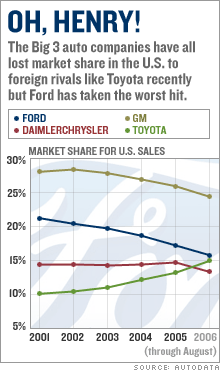|
Why Ford is in worse shape than GM General Motors' turnaround is now in motion, but don't count on Ford having made the same progress this time next year.
NEW YORK (Fortune) -- As he finishes his first full week as CEO of Ford, Alan Mulally may be wondering what he got himself into. The rumble of bad news never seems to stop. Consider:
Ford (Charts) is heading into the same trough that GM (Charts) entered a year ago, and the possibilities of an upturn seem so distant as to be unachievable. But there are major differences between the condition of the two companies that don't weigh in Ford's favor. GM had a turnaround plan already in place. Events tend to move at a glacial pace at the world's largest and most bureaucratic automaker but at least top management had pointed company towards four goals, including build better vehicles. As Ford struggles with its third turnaround plan, the only clear direction is shrinkage. As the old saying goes, you can't cost-cut your way to prosperity. GM had a stable management team in place. CEO Rick Wagoner was a proven executive of long experience and he has been ably assisted by numbers whiz Fritz Henderson and product czar Bob Lutz. Bill Ford was a well-intentioned and well-liked CEO who was punching above his weight. Swirling around him was a revolving door of executives. Anybody remember former Ford big hitters David Thursfield, Nick Scheele, or Jim Padilla today? GM followed through on initiatives. While it sat on the sidelines during the explosion in hybrids, GM insisted that fuel-cells were the answer to high oil prices and global warming. Next week, GM will announce a big fuel-cell initiative that will place it at the forefront of the industry. Ford, on the other hand, made a rosy prediction about the future of hybrids, then backed away when sales of its first hybrid, the Escape failed to match the hype. It has had little to say on the subject since. GM had a reasonable product plan in place There is plenty of blame to go around for starving Saturn, Pontiac, and Buick of new models, but GM has slowly corrected that, having belatedly remembered that autos are a product business. Ford is replacing new models more slowly than Toyota (Charts), Nissan, DaimlerChrysler (Charts), Honda, or GM. And when it does replace them, it has a disconcerting tendency to make the new ones look like the old ones so it is hard for customers to tell. A decade ago, Ford rode the crest of the truck boom and was considered one of the most capable manufacturers on the planet. Its fall has been astonishing. Today the truck boom is over and whatever will be the next big generator of profits is nowhere in sight. Digging out of the current mess will be a team effort that will take several years -- with a successful resolution by no means assured. _______________________________ |
|

